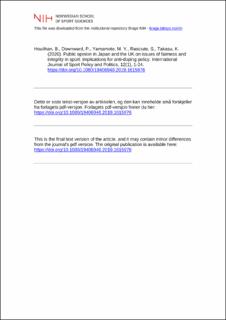| dc.contributor.author | Houlihan, Barrie | |
| dc.contributor.author | Downward, Paul | |
| dc.contributor.author | Yamamoto, Mayumi Yaya | |
| dc.contributor.author | Rasciute, Simona | |
| dc.contributor.author | Takasu, Kumiko | |
| dc.date.accessioned | 2021-02-02T07:14:49Z | |
| dc.date.available | 2021-02-02T07:14:49Z | |
| dc.date.created | 2020-10-12T12:47:55Z | |
| dc.date.issued | 2020 | |
| dc.identifier.citation | International Journal of Sport Policy and Politics. 2020, 12(1), 1-24. | en_US |
| dc.identifier.issn | 1940-6940 | |
| dc.identifier.uri | https://hdl.handle.net/11250/2725689 | |
| dc.description | I Brage finner du siste tekst-versjon av artikkelen, og den kan inneholde ubetydelige forskjeller fra forlagets pdf-versjon. Forlagets pdf-versjon finner du på www.tandfonline.com / In Brage you'll find the final text version of the article, and it may contain insignificant differences from the journal's pdf version. The definitive version is available at www.tandfonline.com | en_US |
| dc.description.abstract | The continuing challenge of achieving compliance with the World Anti-Doping Code had led WADA to place an increasing emphasis on strengthening anti-doping values. Education was given a much higher and clearer profile in the 2015 iteration of the Code and in 2017 WADA established a working group to prepare an International Standard to prioritise values-based education. The aims of this paper are to explore the utility of the ‘spirit of sport’ as a global moral reference point, to assess the significance of cultural values for successful Code compliance and to contribute to the development of values-based education programmes. The research is based on two large-scale surveys of public opinion in Japan and the United Kingdom. The analysis of the data indicated that the general public assess the nature of an action in terms of their own experience and in terms of what is normal in their daily lives rather than in a narrow sporting context. Differences were evident not only between the two countries, but also between genders and age groups within the countries. The challenge for WADA is to appreciate the need to take careful account of the variety of moral reference points found in societies. While the Code is a universal set of regulations the way in which it should be promoted needs to be aligned with the particularities of cultural contexts. | en_US |
| dc.language.iso | eng | en_US |
| dc.subject | world anti-doping code | en_US |
| dc.subject | values education | en_US |
| dc.subject | Japan | en_US |
| dc.subject | United Kingdom | en_US |
| dc.subject | international standard for education | en_US |
| dc.title | Public opinion in Japan and the UK on issues of fairness and integrity in sport: implications for anti-doping policy | en_US |
| dc.type | Peer reviewed | en_US |
| dc.type | Journal article | en_US |
| dc.description.version | acceptedVersion | en_US |
| dc.source.pagenumber | 1-24 | en_US |
| dc.source.volume | 12 | en_US |
| dc.source.journal | International Journal of Sport Policy and Politics | en_US |
| dc.source.issue | 1 | en_US |
| dc.identifier.doi | 10.1080/19406940.2019.1615976 | |
| dc.identifier.cristin | 1838854 | |
| dc.description.localcode | Institutt for idrett og samfunnsvitenskap / Department of Sport and Social Sciences | en_US |
| cristin.ispublished | true | |
| cristin.fulltext | postprint | |
| cristin.qualitycode | 1 | |
